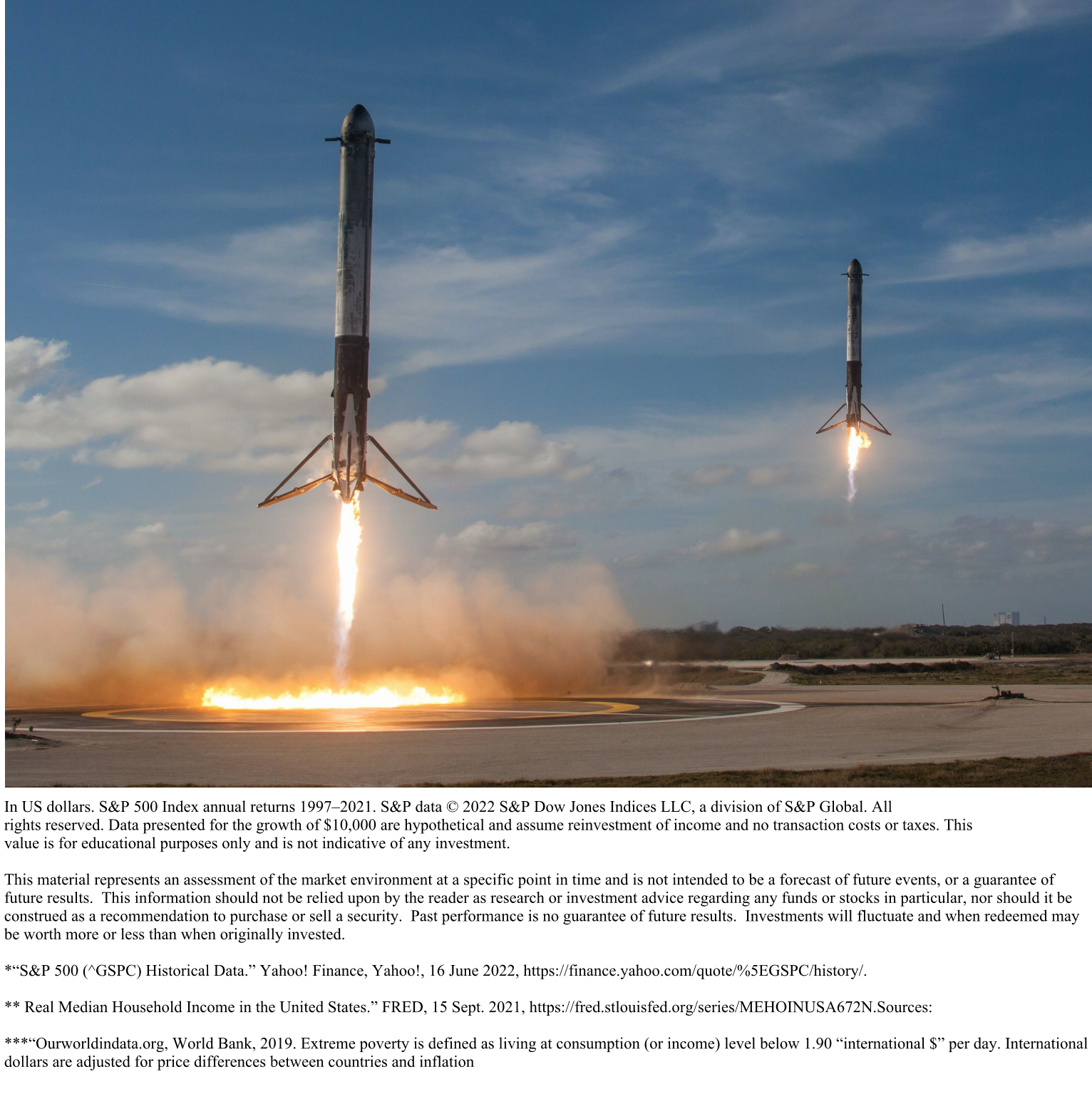Ignore Market Panic by Looking to History
 Imagine for a moment the year is 1997.
Imagine for a moment the year is 1997.
Men in Black is the most popular movie out in theaters. AOL had recently begun charging $19.95/mo for unlimited access to the internet to visit innovative websites like Yahoo, Netscape, or Infoseek. Your neighbor just purchased one of those newfangled DVD players, although the technology was so new, she may only have had handful of movies to watch.
Suddenly there’s a knock at the door. A man at the door wearing weird stretchy clothes called Lululemons claims to be a time-traveler who’s willing to tell you what’s going to happen over the 25 years.
He tells you the following are going to happen:
Two U.S. presidents will be impeached
A terrorist attack will destroy the Twin Towers in New York and kill 3000.
A stock market bubble will burst.
The U.S. will go to war in the Middle East.
A global financial crisis will lead to the most severe recession in the United States since the Great Depression.
Greece will almost default on its debt threatening the existence of the eurozone.
A global pandemic will kill over 1 million in the United States.
The time traveler has one simple question—knowing this, how will you invest your money? You wouldn’t at all, of course!
But what if you had? From January 1997 to December 2021, the S&P 500 averaged a 9.8% per year return*. Hypothetically, if you had invested $10,000 in an index fund tracking the S&P you would have ended 2021 with $102,000.
How could that be?
Despite all of that horrible news, the market managed to return quite near its long-term average. This isn’t financial engineering by the rich to make themselves richer, it’s a reflection of reality.
Imagine for a second how incredible the world in 2022 looks to the person living in 1997.
You may be reading this on your $1000 iPhone, a device that has replaced your need for so many other devices of the past: telephone, camera, radio, GPS, portable music player, flashlight, alarm clock, photo book, address book, and more.
Instead of spending days traveling for a work meeting you may spend an hour on a Zoom call.
Scientists sequenced the human genome.
Reusable rockets deliver satellites into orbit then land safely back on earth.
You ask a robot in your house named Alexa to order toilet paper that is delivered to your front door in a matter of hours.
Median household income, adjusted for inflation, has jumped from $59,000 in 1997 to $67,000 in 2020.**
In 1997, 29.5% of the world lived in what is defined as global poverty, or living on less than $1.90/day. By 2018 that number had dropped to 8.6%.***
The percent of adults in the U.S. who consider themselves smokers dropped from 24.7% to 13.7% in 2018.****
Entire music, movie, and TV catalogs are available to stream on-demand for a small monthly price.
That is why those who invested and stayed the course since 1997 were rewarded with an almost 10% return. The positive return is a reflection that although we faced many challenges along the way, intelligent people at the world’s greatest companies worked to solve the problems in front of them and innovate for a better future.
The cost of those higher long-term average returns of nearly 10% is the uncertainty and volatility an investor will experience along the way. If the stock market had no uncertainty, and therefore no volatility, it’s return would be the same as a risk-free asset like a U.S. government bond.
Therefore, we long-term investors should be happy that there is uncertainty, as it allows us the opportunity for higher returns.
So we must admit to ourselves now that we cannot predict what will happen over the next 25 years, only that there will be adversity and uncertainty along the way. Armed with your knowledge of humanity’s history of solving the challenges that present themselves, commit yourself to ignore the panic and invest for the long-term.
Get new ideas in your inbox once a month
Sign-up to receive a small dose of a financial concept monthly.
Join my email community
In US dollars. S&P 500 Index annual returns 1997–2021. S&P data © 2022 S&P Dow Jones Indices LLC, a division of S&P Global. All
rights reserved. Data presented for the growth of $10,000 are hypothetical and assume reinvestment of income and no transaction costs or taxes. This
value is for educational purposes only and is not indicative of any investment.
This material represents an assessment of the market environment at a specific point in time and is not intended to be a forecast of future events, or a guarantee of future results. This information should not be relied upon by the reader as research or investment advice regarding any funds or stocks in particular, nor should it be construed as a recommendation to purchase or sell a security. Past performance is no guarantee of future results. Investments will fluctuate and when redeemed may be worth more or less than when originally invested.
*“S&P 500 (^GSPC) Historical Data.” Yahoo! Finance, Yahoo!, 16 June 2022, https://finance.yahoo.com/quote/%5EGSPC/history/.
** Real Median Household Income in the United States.” FRED, 15 Sept. 2021, https://fred.stlouisfed.org/series/MEHOINUSA672N.Sources:
***“Ourworldindata.org, World Bank, 2019. Extreme poverty is defined as living at consumption (or income) level below 1.90 “international $” per day. International dollars are adjusted for price differences between countries and inflation
****“Tobacco Trends Brief.” Tobacco Trends Brief | American Lung Association, https://www.lung.org/research/trends-in-lung-disease/tobacco-trends-brief/overall-tobacco-trends.
4787274/DOFU 6-2022
